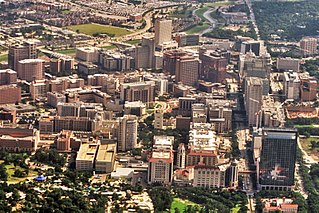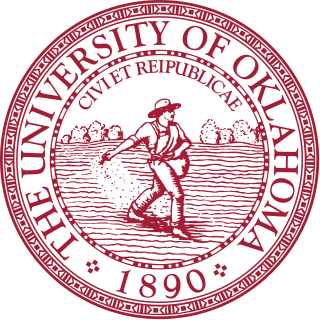
Mayo Clinic is a nonprofit American academic medical center focused on integrated health care, education, and research. It employs over 7,300 physicians and scientists, along with another 66,000 administrative and allied health staff, across three major campuses: Rochester, Minnesota; Jacksonville, Florida; and Phoenix/Scottsdale, Arizona. The practice specializes in treating difficult cases through tertiary care and destination medicine. It is home to the top-15 ranked Mayo Clinic Alix School of Medicine in addition to many of the highest regarded residency education programs in the United States. It spends over $660 million a year on research and has more than 3,000 full-time research personnel.

The Texas Medical Center (TMC) is a 2.1-square-mile (5.4 km2) medical district and neighborhood in south-central Houston, Texas, United States, immediately south of the Museum District and west of Texas State Highway 288. Over 60 medical institutions, largely concentrated in a triangular area between Brays Bayou, Rice University, and Hermann Park, are members of the Texas Medical Center Corporation—a non-profit umbrella organization—which constitutes the largest medical complex in the world. The TMC has an extremely high density of clinical facilities for patient care, basic science, and translational research.

The University of Oklahoma (OU) is a public research university in Norman, Oklahoma, United States. Founded in 1890, it had existed in Oklahoma Territory near Indian Territory for 17 years before the two territories became the state of Oklahoma. In Fall 2023, the university had 32,676 students enrolled, most at its main campus in Norman. Employing nearly 4,000 faculty members, the university offers 174 baccalaureate programs, 199 master's programs, 101 doctoral programs, and 88 certificate programs.

Baylor College of Medicine (BCM) is a medical school and research center in Houston, Texas, within the Texas Medical Center, the world's largest medical center. BCM is composed of four academic components: the School of Medicine, the Graduate School of Biomedical Sciences; the School of Health Professions, and the National School of Tropical Medicine.

The University of Texas Medical Branch (UTMB) is a public academic health science center in Galveston, Texas, United States. It is part of the University of Texas System. UTMB includes the oldest medical school in Texas, and has about 11,000 employees. As of April 2024, it had an endowment of $763 million.
The University of Texas Southwestern Medical Center is a public academic health science center in Dallas, Texas. With approximately 23,000 employees, more than 3,000 full-time faculty, and nearly 4 million outpatient visits per year, UT Southwestern is the largest medical school in the University of Texas System and the State of Texas.
The University of Texas Health Science Center at Houston (UTHealth) is a public academic health science center in Houston, Texas, United States. It was created in 1972 by The University of Texas System Board of Regents. It is located in the Texas Medical Center, the largest medical center in the world. It is composed of six schools: McGovern Medical School, The University of Texas MD Anderson Cancer Center UTHealth Graduate School of Biomedical Sciences, UTHealth School of Dentistry, Cizik School of Nursing, UTHealth School of Biomedical Informatics and UTHealth School of Public Health.
The University of North Texas Health Science Center is a public academic health science center in Fort Worth, Texas. It is part of the University of North Texas System and was founded in 1966 as the Texas College of Osteopathic Medicine, with its first cohort admitted in 1970. UNT Health Science Center consists of six schools with a total enrollment of 2,329 students (2020–21).

The South Texas Medical Center (STMC) or Bexar County Hospital District consists of 900 acres (360 ha) of medical-related facilities on the northwest side of San Antonio, Texas, United States.

Far Eastern University – Dr. Nicanor Reyes Medical Foundation, also referred to as FEU-NRMF, is a non-stock, non-profit medical foundation located at Regalado Ave., West Fairview, Quezon City in the Philippines. It operates a medical school and hospital center. The institution is related to, but independent from, Far Eastern University.

Genome Valley is an Indian high-technology business district spread across 2,000-acre (8.1 km2)/(3.1 sq mi) in Hyderabad, India. It is located across the suburbs, Turakapally, Shamirpet, Medchal, Uppal, Patancheru, Jeedimetla, Gachibowli and Keesara. The Genome Valley has developed as a cluster for Biomedical research, training and manufacturing. Genome Valley is now into its Phase III, which is about 11 km from the Phase I and II with the total area approximately 2,000-acre (8.1 km2).
The University of Oklahoma College of Medicine is the medical school of the University of Oklahoma, located in Oklahoma City. The College of Medicine is part of the university's Health Sciences Center. It is one of only 150 medical schools in the United States that are fully accredited by the Liaison Committee on Medical Education and the only one located in the state of Oklahoma.
The University of Oklahoma Health Sciences Center in Oklahoma City, Oklahoma, United States, is the health sciences branch of the University of Oklahoma. It serves as the primary place of training for many of Oklahoma's health professions. It is one of only four health centers in the United States with seven professional colleges.

Kansas City University (KCU) is a private medical school with its main campus in Kansas City, Missouri and an additional campus in Joplin, Missouri. Founded in 1916, KCU is one of the original osteopathic medical schools in the United States. It consists of both a College of Osteopathic Medicine and a College of Biosciences. KCU is one of the largest medical schools in the nation by enrollment.
An academic medical centre (AMC), variously also known as academic health science centre, academic health science system, or academic health science partnership, is an educational and healthcare institute formed by the grouping of a health professional school with an affiliated teaching hospital or hospital network.
The OU School of Community Medicine (OUSCM), located in Tulsa, Oklahoma, is a branch of the University of Oklahoma College of Medicine. It is the first medical school of its kind in the nation. The OU School of Community Medicine is designed to serve the healthcare needs of entire communities, especially vulnerable and underserved populations. OUSCM is guided by the growing need for more physicians focused on serving vulnerable populations, the growing number of people without access to quality health care, and the relatively poor health status of Oklahomans.
Medical centers in the United States are conglomerations of health care facilities including hospitals and research facilities that also either include or are closely affiliated with a medical school. Although the term medical center is sometimes loosely used to refer to any concentration of health care providers including local clinics and individual hospital buildings, the term academic medical center more specifically refers to larger facilities or groups of facilities that include a full spectrum of health services, medical education, and medical research.
OU Health is the combination of OU Medical Center – Oklahoma City & Edmond, the Children's Hospital, OU Physicians, OU Children's Physicians, the University of Oklahoma College of Medicine, and the Peggy and Charles Stephenson Oklahoma Cancer Center. OU Health focuses on improving health by collaboration, searching for innovation and encouraging high performance.









